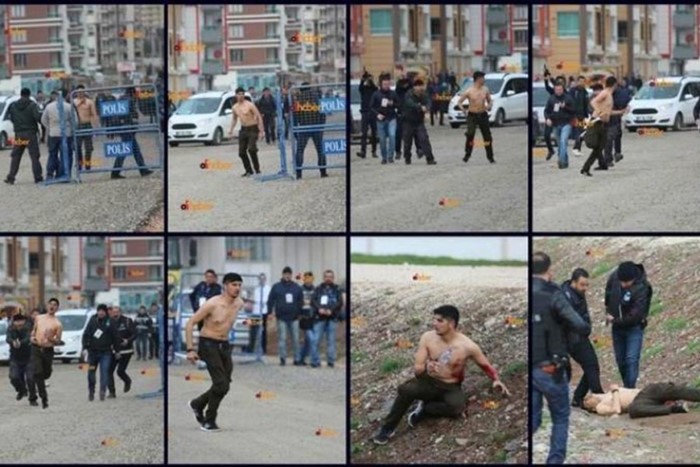The Office of the United Nations High Commissioner for Human Rights (OHCHR) on Tuesday reported on allegations that the human rights violations and abuses in southeast Turkey are massive and serious, calling on the Turkish government for full and unfettered access to be able to directly, independently and objectively assess the human rights situation in the region.
In a 28-page report issued on Tuesday, the OHCHR recommended that Turkey “renew efforts to secure a peaceful end to the situation; and to ensure that every loss of life that occurred in the course of security operations is duly investigated, and that perpetrators of unlawful killings and other human rights violations and abuses are brought to justice.”
The OHCHR focused the human rights violations and abuses in southeast Turkey in 2017:
“OHCHR continued to receive information on numerous human rights violations and abuses perpetrated during the period under review in South-East Turkey in the context of the security operations conducted by the Government of Turkey. The NGO Human Rights Association published statistics of violations that reportedly occurred in the first quarter of 2017 in the eastern and south-eastern Anatolia Region. According to it, the total number of violations amounted to 7,907, included 263 incidents of torture in detention, and over 100 incidents of criminalization of individuals for exercising their right to freedom of expression.
“Incidents between security forces and members of armed groups continued to be reported all over the South-East. According to the Ministry of Defence of Turkey, 10,657 ‘terrorists were neutralized’ from 23 July 2015 and 11 June 2017 in the context of security operations. Given the lack of clarity concerning the term ‘neutralized’, OHCHR requests detailed information concerning the fate of these individuals.
“In addition, OHCHR received credible reports on the following alleged incidents:
i) In February 2017, official round the clock curfews were imposed on nine villages, including Kuruköy, in the Omerli, Nusaybin and Artuklu districts of Mardin province. Subsequently, security operations took place in areas home to, in large part, to Kurdish residents and targeted citizens of Kurdish origin of all ages for their perceived affiliation to the PKK. During the operations conducted in these nine villages, security forces reportedly killed at least three individuals, sexually assaulted women, and committed other acts of torture. They beat, threatened at gunpoint, and fired at several civilians, blocked the transfer of several wounded to the hospital, deprived residents of food, safe drinking water and sanitation, raided and burned houses, placed residents under surveillance, prevented all access to the villages, including by outside observers wanting to monitor the situation, and blocked communication of residents with the outside world by cutting telephone and internet lines.
ii) On 31 August 2017, an armed drone belonging to the Turkish Army reportedly bombed four unarmed people as they were picnicking near the village of Tale (Ogul), Hakkari province. As a result of this attack, one man was killed and three others were wounded. Two of the latter were subsequently arrested after release from hospital. The Government accused the victims of being affiliated with PKK. Following media criticism of this incident, the Minister of Interior reportedly admitted that ‘mistakes could happen’; however, no investigations have been initiated into this incident.
“The UNOSAT analysis of successive imagery between November 2016 and June 2017 revealed ongoing operations of demolitions in Suriçi. According to the analysis of this imagery, a total of 792 buildings were razed in the eastern parts between 8 November 2016 and 28 May 2017, and 10 buildings were razed between 28 May and 7 June 2017. The buildings appeared to have been previously intact. The razed area includes some 30-40 hectares out of around 140 hectares that constitute Suriçi.
“OHCHR notes with concern that Turkey has not implemented the recommendations contained in its first report, notably its call to carry out credible criminal investigations into civilian deaths that occurred in 2015-2016 in the context of security operations conducted by the Government of Turkey in the South-East.
“As indicated in the first OHCHR report, Decree 674 of 1 September 2016 permitted the Central Government to appoint ‘trustees’ in lieu of elected mayors, deputy mayors or members of municipal councils suspended on charges of terrorism. Since September 2016, 87 out of 105 mayors were imprisoned, including 35 women and 52 men. All are of Kurdish origin. As of December 2017, the Ministry of Interior had appointed 94 trustees (only men) in 105 municipalities in South-East Turkey.
“OHCHR echoes the concern of the Commissioner for Human Rights of the Council of Europe that these replacements of mayors and deputy mayors pose ‘fundamental problems vis-à-vis principles of local democracy and is likely to create resentment in the local populations concerned, as it can be perceived as a collective sanction.’
“The Venice Commission called upon the Turkish authorities to provide adequate rules and a legal framework for the reinstatement of suspended/dismissed local representatives in the event that the terrorism-related charges do not lead to a criminal conviction.”
